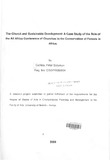| dc.contributor.author | Gichira, Peter S | |
| dc.date.accessioned | 2013-05-09T09:06:51Z | |
| dc.date.available | 2013-05-09T09:06:51Z | |
| dc.date.issued | 2009 | |
| dc.identifier.citation | Degree of Master of Arts in Environmental Planning and Management | en |
| dc.identifier.uri | http://erepository.uonbi.ac.ke:8080/xmlui/handle/123456789/20681 | |
| dc.description | A research project submitted in partial fulfillment of the requirements for the
Degree of Master of Arts in Environmental Planning and Management in the
Faulty of Arts, University of Nairobi - Kenya. | en |
| dc.description.abstract | This research sought to understand the relationship between the attitudes of Christians
as defined by their belief and teachings and how this has affected the conservation of
forests in Africa. It did so by understanding perceptions of the leadership of churches
under the All Africa Conference of Churches as major actors in influencing attitudes
and behaviors of church adherents.
Primary data was obtained using a census that was carried out in the entire 169
membership of the study population and 66 complete questionnaires were received.
Secondary data was also acquired through reviews including the review of Forest Acts
in 13 African Countries to help asses the level of compliance in relation to legislation.
This data was analyzed and used to draw inferences and conclusions for this study.
This research found out that although economic status at the micro-level have a direct
impact on forest conservation efforts, this is not the case at the macro-level, as a
countries economic indicators have no bearing on its conservation abilities. At the
same time, many countries had strived to enact elaborate legislations for sustainable
use of forests. However, levels of degradation have not been reduced by these efforts.
This implies that it is not just economic and legal aspects that influence, there is also
as issue of attitude and perception. Indeed, the study found out that environmental
education was an important asset for environmental conservation. It denotes that for
secure forests, both policy and local levels must be involved in the making of decisions.
This research recommends the need for the church to re-examine its perception about
humanity in relation to the rest of creation for sustainable development to be achieved. | en |
| dc.language.iso | en | en |
| dc.publisher | University of Nairobi | en |
| dc.title | The church and sustainable development: a case study of All Africa Conference of Churches in the conservation of forests in Africa | en |
| dc.type | Thesis | en |
| local.publisher | Department of Arts in Environmental Planning and Management | en |

